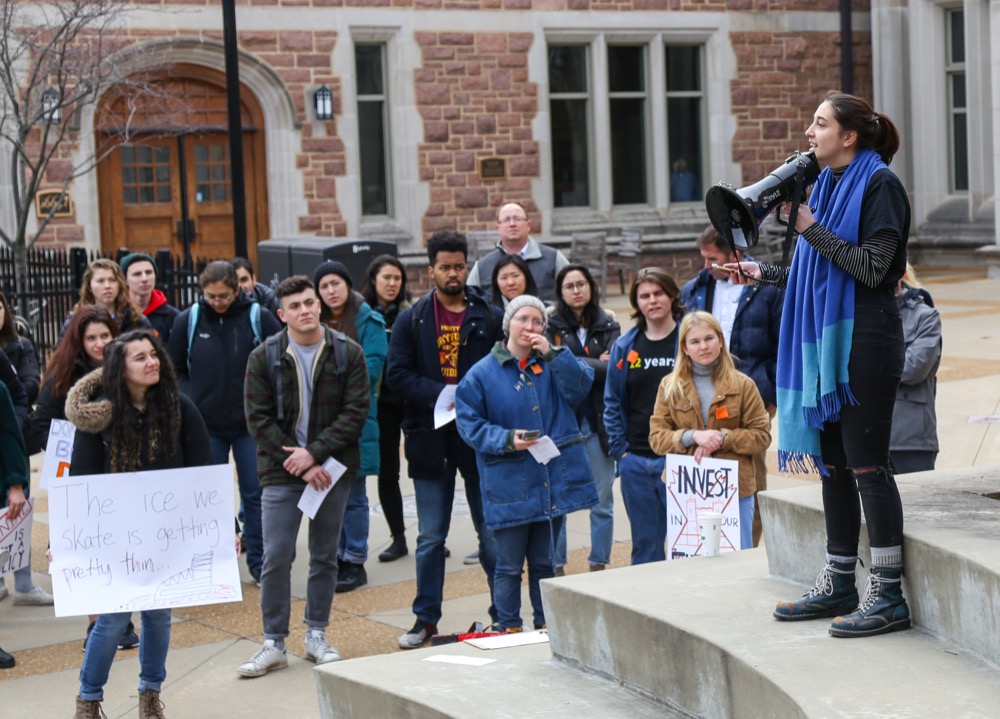News
Fossil Free WashU rallies for divestment; demonstrates on Danforth Campus
Over 100 students joined Fossil Free WashU to protest Washington University’s refusal to divest from fossil fuel companies March 1.
 Grace Bruton | Student Life
Grace Bruton | Student Life Students, faculty and members of the Washington University community gather at a Fossil Free WashU rally Friday afternoon in Edison Courtyard. The protesters gathered to urge the University to divest from fossil fuels.
The protest began with speakers from Student Environmental Council, Washington University faculty and Fossil Free WashU in the Edison Courtyard at 2 p.m. The protestors then walked over to Knight Hall, where the board of trustees had scheduled a meeting. They later gathered outside of Chancellor-Elect Andrew Martin’s office in North Brookings Hall to speak out against the administration’s complacency on environmental issues.
Although the board of trustees elected to move their meeting to the Medical School campus at the last minute, Fossil Free WashU leaders said that they believe the administration cannot continue to avoid listening to the growing student demand for divestment.
“We had over a hundred students show up today, which we think is very indicative of the climate on campus,” Fossil Free WashU’s director of communications sophomore Eddie Ives said. “We frequently interact with and talk to the board of trustees directly along with the chancellor and provost, and we are working with them right now on the transparency committee so we will see how they respond to that going forward.”
Under the new leadership of Martin, the University’s administration is currently in the process of deciding how to respond to student concerns.
“We want our students to feel empowered to express their opinions, especially on issues that are important to them,” Vice Chancellor for Public Affairs Jill Friedman wrote in a statement to Student Life. “The question of divestment is very much on Chancellor-Elect Martin’s radar. He has shared with the Fossil Free student leadership that he is working to see this issue from all perspectives and continues to assess options.”
The administration recently reached out to Fossil Free WashU about the creation of a transparency committee, which will document where the University’s $7.5 billion endowment goes.
“We have been in contact with Martin trying to hammer out the details,” junior Khalid Mahmood, a member of Fossil Free WashU, said. “We are hoping that it can be in place by the fall and it would ideally release a report basically saying where the profit from the endowment goes and what sectors we are invested in. Ideally, we want a sector breakdown among a couple of other things. We also want information publicly available on the website that is easily digestible, and we want graduate and undergraduate students on the committee.”
However, divestment advocates see the transparency committee as only a first step towards addressing larger systemic environmental issues within the University.
“Washington University has within it a fossil fuel mafia,” speaker and anthropology professor Brett Gustafson said. “You can look at the board of trustees and see how their interests are connected. You can look at the advisors to the Center for Environment and Sustainability, no less. That is 95 percent fossil fuel interests. What the f— is that? And they haven’t done anything…At the end of the day, it is going to be up to you to pressure them.”
Fossil Free WashU leaders maintained that the University must significantly change how it invests its endowment in order to call itself a climate leader.
“We invest our tuition money into a $7.5 billion endowment every single year and we have absolutely no say where any of that money goes,” Fossil Free WashU member and senior Jessie Thornton said. “Systemic racism is tied to systemic classism, which is tied to the impacts of climate change and we cannot pretend that that is any different. And neither can the board of trustees and neither can Chancellor-Elect Martin. And to be quite frank, if you are not willing to come in here and listen to what students and faculty are saying, then what are you educating us for?”
Students also wore patches of orange fabric to show solidarity with the international divestment movement, which has caused the divestment of $8 trillion from fossil fuel companies.
“That includes the entire UC school system, the pension fund of New York which is 20 billion dollars, the country of Ireland, Scottish universities, Middlebury College just divested,” Ives said. “Stanford is divested of coal. So other major universities have taken action to be climate leaders. And Wash. U. likes to call itself a climate leader, but never backs that up.”
Just before beginning the march to Knight Hall, Mahmood described the unique role that young student activists can play in the struggle against climate change.
“We are the first generation to experience climate change in its full effect and we are the last one that can do anything about it,” Mahmood said. “It is time to act.”
